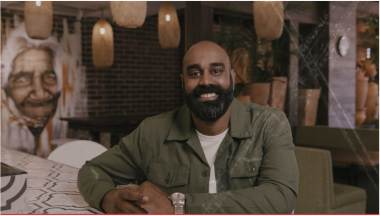Amy is a Sydney-based marketing manager in her early 30s working in financial services. Her husband Idan is in his late 20s and works as a construction site manager. They are recently married and live together in Bondi in a rented apartment. We caught up with Amy to learn about how she and Idan work together to achieve their shared financial goals.
.jpg)
Hi Amy. So are you more of a spender or a saver?
I’m a bit of a mix. When I was younger and started working full time, I was definitely more of a spender. As I’ve gotten older and started thinking about my long-term goals, I’ve become more conscious about how I’m spending money.
I would say I’m still a believer in enjoying life – that’s what it’s all about. I’m really big on going out to celebrate with friends, doing fun activities, having a holiday – spending on things that matter and bring joy.
But within reason. I’ve definitely cut back on buying every single bag that I like or eating out every single day at work because I’m too lazy to cook!
And what about your partner?
By nature, Idan’s probably a bit more of a saver. He grew up overseas and then left home when he was 18 before moving to Australia when he was 20. So having to support himself through university in a different country made him more conscious of how much he was earning and how much he had to spend.
Tell us a bit about your financial goals when you were single
Getting a foot on the property ladder was a big one. But there was no way I could afford to buy near where I lived so I set my goal to buy an investment property in an area I could afford, rather than a property to live in.
After many years of saving for a deposit, I bought an investment property off the plan. Construction has recently completed, and it’s just settled.
I had no idea how confusing purchasing a property is. Going through the process of arranging a home loan and understanding what an offset account is, as opposed to a savings account.
I had contingency in my budget but there were a lot of costs I’d never thought of. It’s a learning journey and it was really scary, especially signing the home loan application.
I had a lot of conversations with the person at my bank who organised the loan, and with friends and family who had done it previously. Now it’s settled I feel much more relaxed.
We’ll see how it goes and hopefully it was a good financial decision.
Now you're married, how do you manage your everyday expenses?
We have an idea of our general monthly costs. We know what our rent is, what our bills are and how much we’re spending on food. So every month we set aside that money, plus a bit extra for emergency expenses and savings, and that sits in an account. And the rest of the money is in short-term savings for fun activities.
We use an offset account as the primary account to manage payments and expenses related to the investment property. Separate from the investment, we use a joint transaction account for everyday purchases and a high-interest savings account that helps us to build up our joint savings and provide a pool of funds for major purchases.
But we’re looking to consolidate our accounts to make better use of our offset account and hopefully pay less on our mortgage repayments.
Are you both on the same page when it comes to financial matters?
Money is a really sensitive subject for a lot of people and can cause a lot of conflict. But we’ve always had a really open and honest communication style.
I would say we’re very aligned in terms of what we’re happy to spend on social activities and taking a holiday when we need it.
I don’t micromanage how Idan spends his money. So if he goes out and buys something, I’m not like ‘Why did you do that?’
But we both know that if there’s a concern we can bring it up. So it’s important to continue having an open conversation about money.
So how are you dealing with your investment property?
We had a frank discussion around how we’re going to treat the property. And we agreed as we approached our marriage that we’d like to see things as shared goals. So we’ll service the loan together and moving forward we’ll treat it as our investment property, not just mine. But I am definitely the more practical one in the relationship so we had a contract drawn up about what would happen to the property if we did break up – just a real practical solution. We had an open conversation about what that would look like. The other element was when I bought the property interest rates were a lot lower than they are now. But Idan’s happy to support me in the investment while we work towards buying our forever home eventually.
You've recently got married. Congratulations! How are you approaching your long-term goals as a couple?
From the onset of our relationship we were very open about how we wanted to spend our money and what we would eventually want for our lives.
It’s developed naturally as the relationship got more serious and we started discussing whether we’d eventually want to buy a house, what area we’d want to live in, and what that would look like.
Idan has started looking at properties and hopefully in the near future we’ll start putting together a proper plan for saving for a deposit. It’s an ongoing conversation.
We’re looking at different areas around Bondi where we live and we’ll continue to rent until we can find the right property that we can afford.
We're here to help
Whether you’re in a couple like Amy and Idan or a footloose and fancy-free singleton, we have some great tools that can help you achieve your goals.
If you’re looking at creating a daily budget, AMP’s Budget planner calculator can help you better understand your income and expenses.
If you’re looking at buying a place, AMP’s Borrowing power calculator can help you work out how much you can afford.
And if you’re managing a home loan, AMP’s Home loan repayments & offset calculator can help you estimate how much interest you’ll pay.

Combatting social inequality through a love of food and culture
30 October 2024 | Blog Shaun Christie-David, Founder and CEO of Plate it Forward and 2020 AMP Foundation Tomorrow Maker awardee, shared his inspiring journey from banking to running a social enterprise. Through his love for food and commitment to breaking the cycle of inequality, Shaun has created a movement that exceeds the culinary realm. Plate it Forward, which started with Colombo Social, has grown to include multiple ventures. Shaun's story is a testament to resilience, cultural exchange, and the power of community support. Read more
State Of The Nation – The AMP Financial Wellness Report 2024
23 September 2024 | Managing money How we’re feeling about our finances and what we can do about it. Read more
Firm Foundations – How We’re Beating The Financial Blues
23 September 2024 | Managing money Getting the basics right – budgeting, saving and spending – can help improve your financial wellbeing. Read moreWhat you need to know
AMP Bank Limited ABN 15 081 596 009, AFSL and Australian Credit Licence 234517.
Information on this page is subject to change without notice.
We are not providing financial product advice. You should consider obtaining independent advice before making any financial decisions.
AMP Bank is a member of the Australian Banking Association (ABA) and is committed to the standards in the Banking Code of Practice.
The credit provider for all banking products is AMP Bank Limited ABN 15 081 596 009, AFSL and Australian Credit Licence 234517. Approval is subject to AMP Bank guidelines. Terms and conditions apply and are available at amp.com.au/bankterms or by calling 13 30 30. Fees and charges are payable.
Any advice and information is provided by AWM Services Pty Ltd ABN 15 139 353 496, AFSL No. 366121 (AWM Services) and is general in nature. It hasn’t taken your financial or personal circumstances into account.
It’s important to consider your particular circumstances and read the relevant product disclosure statement, Target Market Determination or terms and conditions, available from AMP at amp.com.au, or by calling 131 267, before deciding what’s right for you.
You can read our Financial Services Guide online for information about our services, including the fees and other benefits that AMP companies and their representatives may receive in relation to products and services provided to you. You can also ask us for a hardcopy.
All information on this website is subject to change without notice. AWM Services is part of the AMP group.